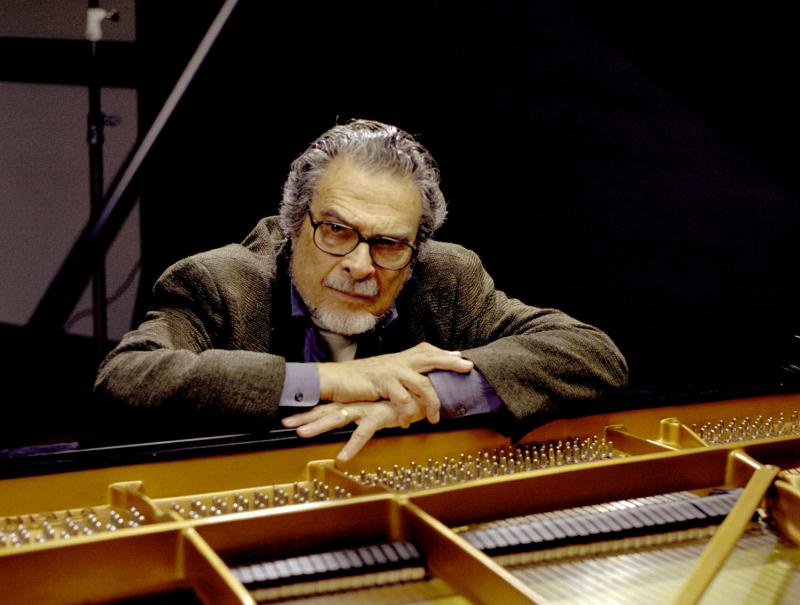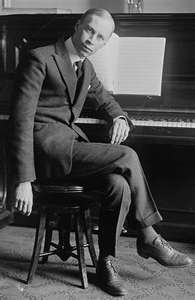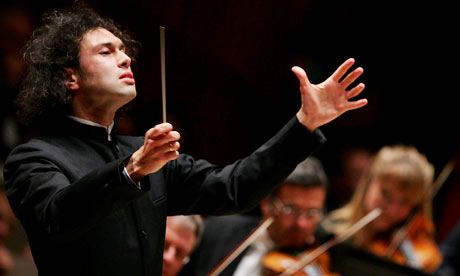Fleisher, London Philharmonic Orchestra, Jurowski, Royal Festival Hall | reviews, news & interviews
Fleisher, London Philharmonic Orchestra, Jurowski, Royal Festival Hall
Fleisher, London Philharmonic Orchestra, Jurowski, Royal Festival Hall
Prokofiev festival finds showmanship if not soul in the composer's ballet music

The London Philharmonic’s current festival – Prokofiev: Man of the People? – is all about the question mark. While the festival’s concerts, lectures and even its classical club-night each make their own statement, the overarching spirit here is one of exploration, of questioning. Jurowski and his orchestra are peeling back the composer’s grinning modernist mask and attempting to expose the human face (or possibly faces) behind it.
Chout (“The Buffoon”) was composed between 1915 and 1921, while Prokofiev was still at large in the West, balancing his revolutionary musical instincts with the notional role of Soviet cultural emissary. Playing to the crowd in this, his first successfully staged ballet, Prokofiev pillages, satirises and exoticises Russian folk traditions, creating a work whose grotesque little plot is more than matched by the music for lurid colour.
All Jurowski’s astringent precision was needed to keep this magnificent musical obscenity on the right side of absurd
What the story lacks in coherence (I’m still not entirely clear where the goat comes in) it makes up for in sensation, kicking off with the casual murder by seven buffoons of their wives. The architect of all this bloodshed is an eighth buffoon, who thanks to some strategic cross-dressing and surreal plot convulsions survives the ballet to scheme another day. Gaudy in its musical characterisation, and no less lavish in its orchestration, the score revels and romps its way through various musical set-pieces. A lumbering round dance spells doom for the wives in its baleful minor, while the buffoon’s attempt to disguise himself as a young woman is exposed in the harmonic wrong-footedness of harp accompaniment.
 It’s all very knowing, very deliberate, right up to the Russian-accented Hollywood finale, where orchestral technicolour sees a crazed string tarantella climax into brassy fireworks. All Jurowski’s astringent precision was needed to keep this magnificent musical obscenity on the right side of absurd. Marshalling the overgrown sprawl of the LPO, he gave Prokofiev (pictured right) the benefit of the doubt, leading the audience to the witty jazz inflections, the many colours in the orchestration (some beautiful work from brass and flutes especially), without dwelling too much on the ballet’s more reductive elements.
It’s all very knowing, very deliberate, right up to the Russian-accented Hollywood finale, where orchestral technicolour sees a crazed string tarantella climax into brassy fireworks. All Jurowski’s astringent precision was needed to keep this magnificent musical obscenity on the right side of absurd. Marshalling the overgrown sprawl of the LPO, he gave Prokofiev (pictured right) the benefit of the doubt, leading the audience to the witty jazz inflections, the many colours in the orchestration (some beautiful work from brass and flutes especially), without dwelling too much on the ballet’s more reductive elements.
What a difference a few decades make. Cinderella (1944) finds the composer back in Russia, bound by state censorship and stylistic whims. The result is much the more conservative work, the product of Prokofiev’s desire to create an intelligent yet accessible genre that would speak directly to the nation. The self-styled “people’s artist” here favours generous string melodies (though often undercut as in the Introduction by some subversive chromatic mutterings in the brass), and programmatic writing that conjures a Dalí-esque soundscape of midnight, complete with frantically ticking woodblock.
 To hear chamber poise from an orchestra of this size – precision that goes beyond neatly dovetailed dialogues and sees the musicians really listening – is thrilling, and while Cinderella is entertaining enough, it was the purely musical narrative that was most compelling here. The LPO have made this music their home, and whether or not the composer’s fabled humanity was much on display matters little when the orchestra’s own was so amply evident.
To hear chamber poise from an orchestra of this size – precision that goes beyond neatly dovetailed dialogues and sees the musicians really listening – is thrilling, and while Cinderella is entertaining enough, it was the purely musical narrative that was most compelling here. The LPO have made this music their home, and whether or not the composer’s fabled humanity was much on display matters little when the orchestra’s own was so amply evident.
Yet there were moments when the Royal Festival Hall acoustic could have taken more, moments where another conductor would have ramped up his forces further, faster, harder. It would have been exhilarating, but would have sacrificed the evening’s greater arc for a few glorious seconds. Jurowski (pictured above) played a long game here, withholding at times, but always with one eye to the greater context of the evening and (I suppose) the festival.
The cooler tones of the Fourth Piano Concerto played into this, paring back the orchestra to a back-up group for Leon Fleisher’s solo line. Written in reaction to (and rejection of) Ravel’s left-handed piano concerto, Prokofiev’s proved less successful with its commissioner. You can hear why; in place of glassy lyricism there are passages of rather thankless arppegiating (negotiated efficiently if not entirely fluidly by Fleisher), often coloured by orchestral doublings. At his best in the rhythmic eddies and flurries of the opening and closing Vivace movements (though I missed any real sense of glee in the latter), Fleisher never quite seemed to overcome the work’s own limitations, delivering a more forceful performance than the piece seemed able to withstand.
A few slips of ensemble in the concerto aside, there can be little doubt of the supremacy of Jurowski and the LPO in this repertoire. If they didn’t quite manage to turn a question mark into a full-stop last night, it was a failure more interesting than many successes. The jury are still out on Prokofiev’s humanity, but when modernist showmanship sounds this good a soul is an extra I for one am happy to do without.
Buy
Explore topics
Share this article
Add comment
The future of Arts Journalism
You can stop theartsdesk.com closing!
We urgently need financing to survive. Our fundraising drive has thus far raised £49,000 but we need to reach £100,000 or we will be forced to close. Please contribute here: https://gofund.me/c3f6033d
And if you can forward this information to anyone who might assist, we’d be grateful.

Subscribe to theartsdesk.com
Thank you for continuing to read our work on theartsdesk.com. For unlimited access to every article in its entirety, including our archive of more than 15,000 pieces, we're asking for £5 per month or £40 per year. We feel it's a very good deal, and hope you do too.
To take a subscription now simply click here.
And if you're looking for that extra gift for a friend or family member, why not treat them to a theartsdesk.com gift subscription?
more Classical music
 Appl, Levickis, Wigmore Hall review - fun to the fore in cabaret and show songs
A relaxed evening of light-hearted fare, with the accordion offering unusual colours
Appl, Levickis, Wigmore Hall review - fun to the fore in cabaret and show songs
A relaxed evening of light-hearted fare, with the accordion offering unusual colours
 Lammermuir Festival 2025, Part 2 review - from the soaringly sublime to the zoologically ridiculous
Bigger than ever, and the quality remains astonishingly high
Lammermuir Festival 2025, Part 2 review - from the soaringly sublime to the zoologically ridiculous
Bigger than ever, and the quality remains astonishingly high
 BBC Proms: Ehnes, Sinfonia of London, Wilson review - aspects of love
Sensuous Ravel, and bittersweet Bernstein, on an amorous evening
BBC Proms: Ehnes, Sinfonia of London, Wilson review - aspects of love
Sensuous Ravel, and bittersweet Bernstein, on an amorous evening
 Presteigne Festival 2025 review - new music is centre stage in the Welsh Marches
Music by 30 living composers, with Eleanor Alberga topping the bill
Presteigne Festival 2025 review - new music is centre stage in the Welsh Marches
Music by 30 living composers, with Eleanor Alberga topping the bill
 Lammermuir Festival 2025 review - music with soul from the heart of East Lothian
Baroque splendour, and chamber-ensemble drama, amid history-haunted lands
Lammermuir Festival 2025 review - music with soul from the heart of East Lothian
Baroque splendour, and chamber-ensemble drama, amid history-haunted lands
 BBC Proms: Steinbacher, RPO, Petrenko / Sternath, BBCSO, Oramo review - double-bill mixed bag
Young pianist shines in Grieg but Bliss’s portentous cantata disappoints
BBC Proms: Steinbacher, RPO, Petrenko / Sternath, BBCSO, Oramo review - double-bill mixed bag
Young pianist shines in Grieg but Bliss’s portentous cantata disappoints
 theartsdesk at the Lahti Sibelius Festival - early epics by the Finnish master in context
Finnish heroes meet their Austro-German counterparts in breathtaking interpretations
theartsdesk at the Lahti Sibelius Festival - early epics by the Finnish master in context
Finnish heroes meet their Austro-German counterparts in breathtaking interpretations
 Classical CDs: Sleigh rides, pancakes and cigars
Two big boxes, plus new music for brass and a pair of clarinet concertos
Classical CDs: Sleigh rides, pancakes and cigars
Two big boxes, plus new music for brass and a pair of clarinet concertos
 Waley-Cohen, Manchester Camerata, Pether, Whitworth Art Gallery, Manchester review - premiere of no ordinary violin concerto
Images of maternal care inspired by Hepworth and played in a gallery setting
Waley-Cohen, Manchester Camerata, Pether, Whitworth Art Gallery, Manchester review - premiere of no ordinary violin concerto
Images of maternal care inspired by Hepworth and played in a gallery setting
 BBC Proms: Barruk, Norwegian Chamber Orchestra, Kuusisto review - vague incantations, precise laments
First-half mix of Sámi songs and string things falters, but Shostakovich scours the soul
BBC Proms: Barruk, Norwegian Chamber Orchestra, Kuusisto review - vague incantations, precise laments
First-half mix of Sámi songs and string things falters, but Shostakovich scours the soul
 BBC Proms: Alexander’s Feast, Irish Baroque Orchestra, Whelan review - rapturous Handel fills the space
Pure joy, with a touch of introspection, from a great ensemble and three superb soloists
BBC Proms: Alexander’s Feast, Irish Baroque Orchestra, Whelan review - rapturous Handel fills the space
Pure joy, with a touch of introspection, from a great ensemble and three superb soloists
 BBC Proms: Moore, LSO, Bancroft review - the freshness of morning wind and brass
English concert band music...and an outlier
BBC Proms: Moore, LSO, Bancroft review - the freshness of morning wind and brass
English concert band music...and an outlier

Comments
I feel it is a mistake to